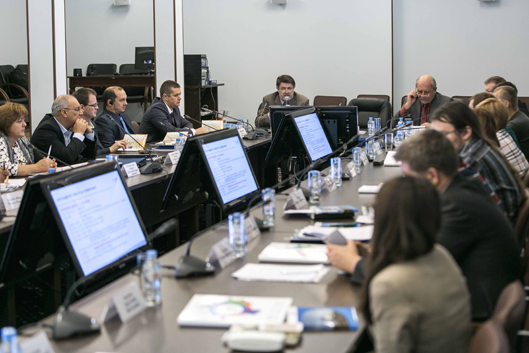The Novovoronezh NPP: the nuclear power experts have shared their experience in operating the modern chemical water treatment system during the WANO seminar
This time, the nuclear power experts from Russia, Hungary, the Czech Republic, and Iran, along with the deep water treatment equipment manufacturers took part in the event.
The main goal of the WANO seminar is to promote the operational safety of the nuclear power plants by pooling the efforts and exchanging experience on high-quality demineralized water production using reverse osmosis.
“It turned out that reverse osmosis, the modern water demineralization technology, is being actively used at the Eastern European NPPs. The filtering membranes are so-called molecular gates that transmit water molecules only. The impurities’ molecules are held back and disposed of”, Mikhail Schedrin, the head of the Novovoronezh NPP’s chemical workshop, said.

A system like this was implemented at the Novovoronezh NPP’s power blocks under construction about a year ago. The chemical workshop experts have presented the case study on launching the chemical water treatment system during the seminar. One of the main advantages of the membrane water treatment system is the fact that it’s friendly to the environment.
The chemicals, such as sulfuric acid and alkali, are used here for additional purification of the post-filtered permeate water (partially demineralized water). Those are used 10 times less compared to chemically demineralized water production using ion-exchange technologies. As a result, the waste discharge into the environment is reduced 10 times, too.
The purity of the water used at an NPP is something safe nuclear power plant’s operation relies on. Alloys such as chlorides, sulfates, calcium, and magnesium get extremely aggressive under the high temperatures used in the nuclear power industry and can affect the containments, e.g., the fuel element jacket, the reactor vessel, the steam generator’s heat exchange surface. Absolutely pure and demineralized water is to be used to avoid these complications.
During the seminar, the participants paid a visit to the Novovoronezh NPP’s 6th power block under trial production and could witness the way the modern chemical water treatment system operates.
Since 2007, the innovative 6th and 7th power blocks with the capacity of 1200 megawatts each have been constructed at the Novovoronezh NPP’s site. The 7th power block is currently undergoing construction and assembly activities and is planned to be completed in 2018.
The Novovoronezh nuclear power plant is a branch of the JSC "Concern Rosenergoatom". The station is located on the bank of the Don River in 42 km to the south of Voronezh. It is the Russia's first nuclear power plant with VVER reactors (water-to-water power reactors of case type with regular water under pressure). Each of five reactors of the station can be a main one – a prototype of serial power reactors: the power unit No. 1 with the VVER-210 reactor, the power unit No. 2 with the VVER-365 reactor, the No. 3, 4 power units with the VVER-440 reactors, the power unit No. 5 with the VVER-1000 reactor. The first power unit was launched in 1964, the second – in 1969, third – in 1971, fourth – 1972, fifth – 1979. There are three power units (power units No.1, 2 were stopped in 1984 and 1990 respectively) in work at the moment.
The up-to-date information on the nuclear environment close to the Russian NOOs and other nuclear objects is available at www.russianatom.ru
Novovoronezh NPP Information and Public Relations Administration.

 career
career Innovations
Innovations Projects
Projects INTERNATIONAL BUSINESS
INTERNATIONAL BUSINESS